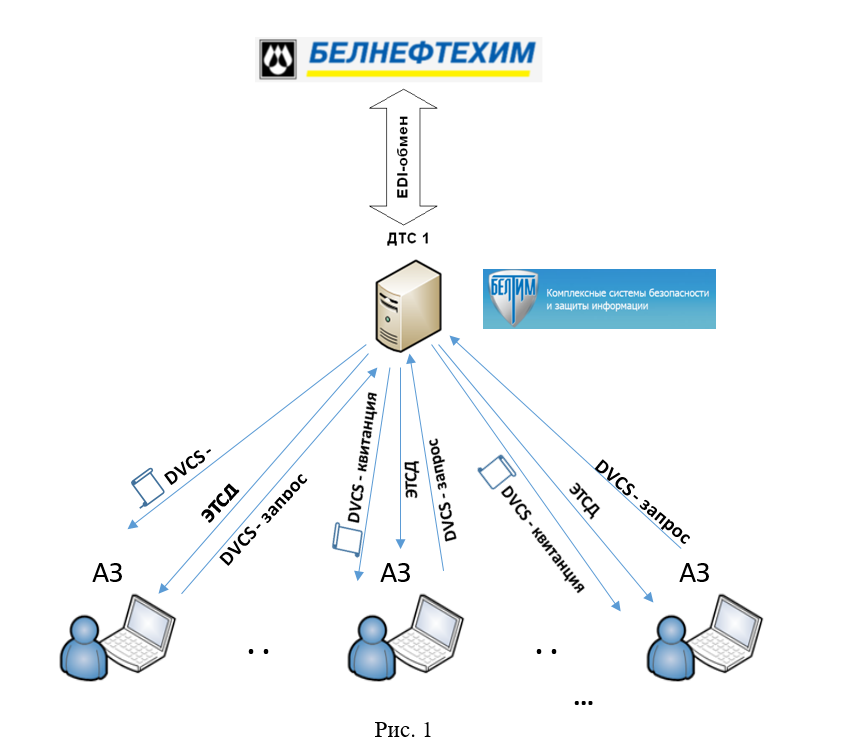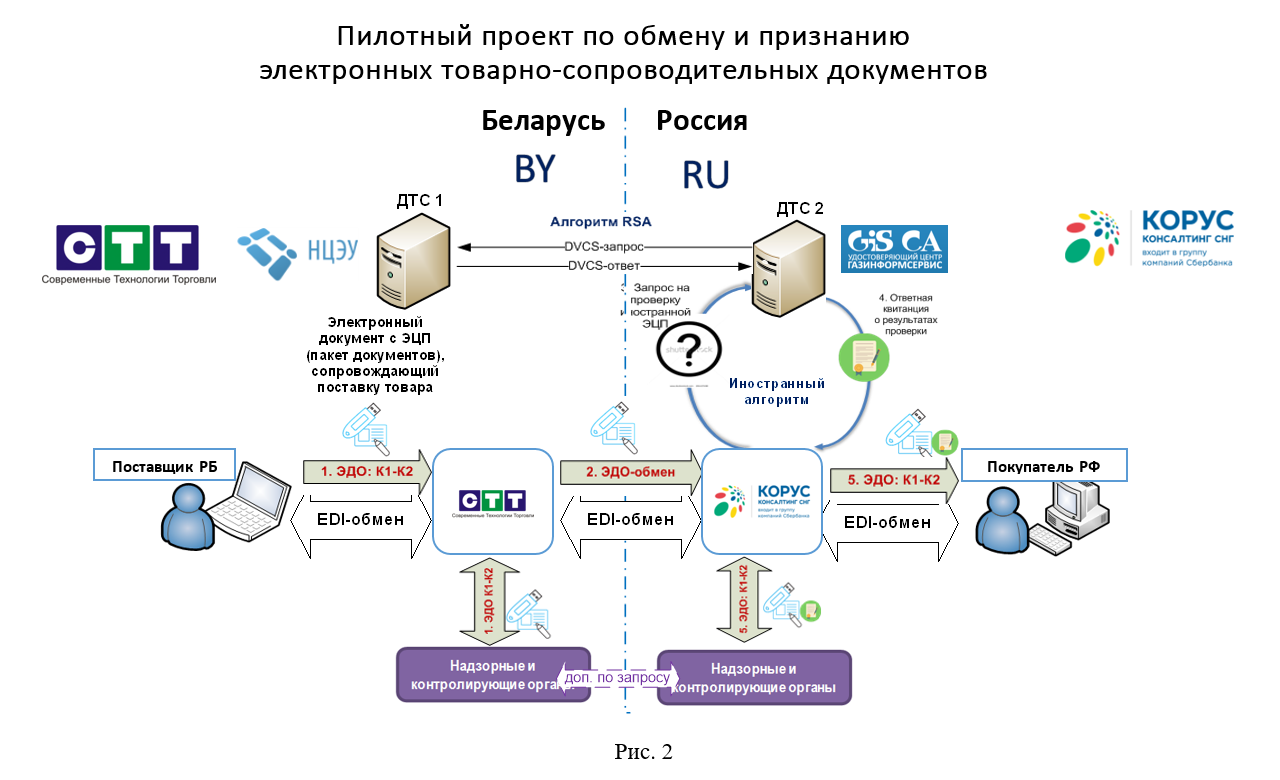Russia - TPA - Belarus: Here the third is not superfluous
God loves the trinityIf two speak different languages, a translator is indispensable
(proverb)
When two state leaders speak different languages at international negotiations, then two translators cannot do without the diplomatic protocol.
Similarly, when two organizations from different countries use an electronic signature in their workflow, one cannot do without the so-called trusted third party (TPA). Especially if in their native jurisdictions, their own independent cryptography is adopted at the legislative level.
It is the attraction of TPA by such business partners from two different countries with different cryptography that makes their electronic document management legally significant.
So what exactly is this mysterious “Trusted Third Party”? To define TPA, let us turn to draft federal law No. 747528-7 “On Amending Certain Legislative Acts of the Russian Federation in Connection with Improving Regulation in the Field of Electronic Signature”. The draft law introduces a new participant in electronic document management (EDI) - a trusted third party - and defines it as a “legal entity engaged in the verification of electronic signatures in electronic documents at a specific point in time with respect to a person who has signed an electronic document to ensure trust in the exchange of data and electronic documents; ”.
From this definition it follows that verification of electronic signatures by means of TPA can be carried out not only with cross-border electronic document management. The implementation of this service in the cloud solution mode, which ensures the correct implementation of electronic signature verification, even within the same jurisdiction, is highly demanded and justified.
As an example, let’s cite a project implemented by Beltim SB CJSC (a subsidiary of Gazinformservice LLC in Belarus) in the interests of the Belorussian State Concern (BCC) Belneftekhim and a network of petrol stations. The structural diagram of the project is presented in Figure 1.

According to the project plan, it was necessary to provide paperless EDI using an electronic signature between gas station networks and Belneftekhim, an oil products supplier. The difficulty was that the gas station operators did not have electronic digital signature tools at their workplaces (in Belarus - EDS), which did not allow for the verification of EDS. It is this service that is performed using the TPA of Beltim SB CJSC. Each gas station gets access through its WEB-interface to its personal account, into which electronic goods accompanying documents (EDSD) are sent from Belneftekhim BCC through the EDI operator.
In each personal account, you can make a request to check the digital signature under the EDSD, the so-called DVCS request. The operator of the gas station can only press the button “Check electronic signature” in your account to receive the result of the verification in the form of a receipt. If the verification result is positive, the ETSD is accepted for payment. This project is a classic example of the provision of electronic signature validation services. It is simple and economical.
Regarding the implementation of cross-border EDI, the experience of two trading business partners from Belarus - and Russia in organizing cross-border EDI with documents accompanying the mutual supply of goods is interesting. Two EDI operators were also involved to provide EDI with electronic documents: from Belarus - OOO Modern Trade Technologies (OOO STT) and from Russia - KORUS Consulting CIS. A pilot project on the exchange and mutual recognition of ETSD has been implemented. The block diagram of the composition and interconnection of the components of the pilot project is presented in Figure 2.

To verify the electronic signature under the EDSD, two operators of the electronic signature verification service were involved: from the side of Belarus - the State Unitary Enterprise "National Center for Electronic Services" (NCEU), and from Russia - LLC "Certification Center GAZINFORMSERVICE" (LLC "UC GIS).
Let us consider in more detail the implemented EDI ETSD process between a supplier of goods from Belarus and a buyer of goods from Russia. A supplier from Belarus, delivering the goods, transfers the EDSD signed by the ES created using the cryptographic standard of the Republic of Belarus to the operator of the EDT LLC STT, which in turn transfers the EDSD to the operator of the EDI from Russia - KORUS Consulting CIS. When processing EDSD, the latter determines that they are signed by foreign cryptography and cannot guarantee their legal significance in accordance with the legislation of the country in which the electronic document was created and signed. Further, KORUS Consulting CIS generates a request for verification of the electronic information and communications system and sends it for verification to UC GIS LLC.
In its turn, UC GIS LLC determines that the ETSD is signed with a Belarusian signature and sends a request for verification of electronic signatures to the Belarusian DTS operator - NCEEU. The NCEE performs verification of the Belarusian signature, generates a receipt of the verification results, signs it with its electronic signature and transfers this receipt to the Russian partner - UC GIS LLC - the operator of the electronic signature verification service. UC GIS LLC checks the electronic signature under the receipt and, if it is correct, signs it with its electronic signature on Russian cryptography. Then the receipt is sent to the Russian operator EDO KORUS Consulting CIS, which passes it along with the EDS to the buyer. The buyer, based on the results of the verification reflected in the receipt, makes a decision on acceptance or refusal to accept ETSD. At this B2B - site EDI is completed. As part of state control procedures in both countries, these cross-border ETSDs can be submitted for reporting to the tax authorities. In Belarus, the MNF accepts such documents. Unfortunately, there is no Federal Tax Service in the Russian Federation - they are awaiting the adoption of the above amendments to 63-.
Two of the above projects, successfully implemented by the Gazinformservice Group of Companies, in cooperation with trading partners from Russia and Belarus, show that TPA services are in demand both within the same jurisdiction and on a cross-border scale, and the digitalization course provides good opportunities for such projects.
Sergey Anatolyevich Kiryushkin,
Ph.D., Advisor to the General Director of Gazinformservice LLC
Kustov Vladimir Nikolaevich,
Doctor of Technical Sciences, Professor, Advisor to the General Director of UC GIS LLC

All Articles